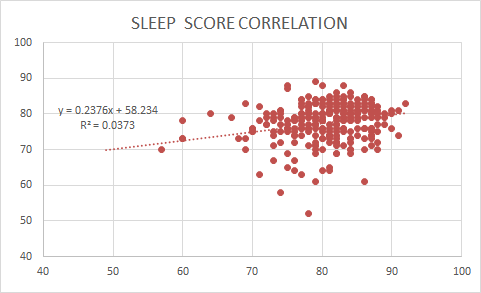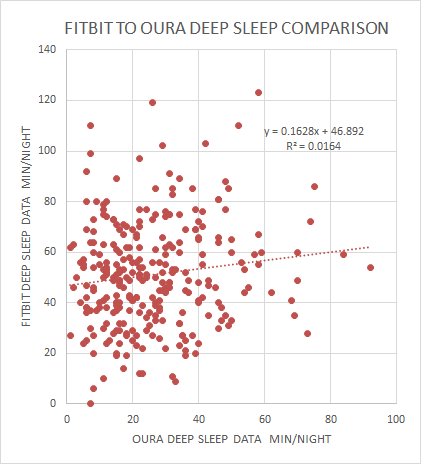Here is a typical comparison of sleep scores for Oura and Fitbit (recorded for the same night).

Here is a typical comparison of sleep scores for Oura and Fitbit (recorded for the same night).

Interesting data… What we need is a comparison to polysomnography.
My bias, as an owner, is that Oura is more accurate that Fitbit. Certainly Matthew Walker wears one…
I learned from the Oura analysis that I was getting very low REM and Deep sleep, so I started experimenting with different supplements and different evening patterns.
After a lot of trial and error, my REM and Deep are now both regularly scoring at acceptable amounts. I feel better and more energetic during the day and will continue to experiment with variations. I havent paid much attention yet to the other sleep scores.
For tracking exercise I wouldnt recommend Oura. At this point my concern has been with sleep quality
Could you pls share what supplements you are taking for better sleep score?
I’ve had consistent improvement from a combination of 2 PureEncapsulation products: Best Rest (I take 1 instead of 2 caps) and Pure Tranquility (I take 2 dropper fulls instead of 4). These are fairly pricey. Note that each product by itself didnt get consistent benefits, but this combination has been working.
I’m also experimenting with glycine, taurine, and ashwaghanda and plan to try apigenin, but no consistent results to report yet.
The problem with using your ring to analyze your deep sleep is that the deep sleep evaluation may not be even remotely correct. Here is a comparison of the deep sleep values recorded by Oura and Fitbit. I believe I read that some Oura rings record low values of deep sleep so they have started a beta version which they provide for comparison each day. I find no correlation between the new deep sleep values and no correlation between the new deep sleep value and that of Fitbit.

Note the low R^2 (.016) value indicates almost no correlation between the two, so when my Oura says I got 5 mins of deep sleep my Fitbit has recorded as many as 110 minutes.
That discrepancy makes it difficult to actually know what action, if any, that I need to take to get better sleep. My take on all of this is that a random number generator would be just as useful. Even the trends do not agree. For instance, when one tracker reads a relatively high (or low) value the other has no tendency to do the same. I wish these were better but I believe the technology may have inherent limitations.
I must be missing something because if Oura is correct and Fitbit is incorrect, wouldnt we expect just the kind of correlation you have found?
I do think the Oura is over priced and for fitness tracking relatively worthless. Based on my n=1, though, I’m confident in its data and satisfied with how useful and consistent its been, including its Sleep Stage Beta version.
I have consistent effect from taurine. I take approx 1,5 gr if I wake up during the early part of the night. It makes it easier to go back to sleep.
I have tried 2-3 gr glycine right before going to bed, and I find that glycine works well on its own, but I get a stronger effect when I take Glycine together with apigenin (400-500 mg powder). I have many years experience from taurine. Glycine and apigenin are new to me, since 4–5 months.
Sorry, I did not mean to say that Fitbit is correct and that Oura is not, just that neither one provides any verifiable information regarding sleep details except for the amount of time slept. And, yes, this is the result one should expect from mutually inaccurate measurements. I think we have been sold these “fitness” trackers without solid peer reviewed evidence for their validity.
I agree that there isnt any overwhelming science to support the accuracy of the sleep stages.
I am swayed by the consistency of the sleep data when my personal variables are controlled, e.g. the supplements taken, time of last caffeine, the time of last meal and water intake. That’s admittedly a pretty low level of evidence. I’ll take what I can get until something better comes along.
in the recent tim ferris interview andrew huberman mentioned offhand that something like Sleep Eight (mattress cover) is more accurate with sleep stages than Oura because it can track body movement better. I have both and my oura always shows very low REM and high deep sleep. My Eight Sleep shows im getting much more REM. My take away is don’t put too much stock in the sleep phase readings.
I have experimented with captopril and it improves the sleep score on my Samsung watch
I trust my apple watch, of course it is not perfect, but here is a comparison test with EEG for 18 consecutive nights and it comes pretty close or close enough.
I must add that since starting rapamycin my sleep pattern improved and my deep sleep score went up 50% even if I do sleep less I feel more rested upon waking. My deep sleep was pretty consistent since I use apple watch to track my sleep and it was around 30 minutes, since starting rapamycin the average increased to 44 minutes. Before starting rapamycin getting to that number was really hard especially as I am a late sleeper and rarely go to bed before 1 or 2 AM…
Interesting news on coffee and sleep…
A new study finds that chronic caffeine consumption has surprising effects on sleep patterns and brain blood flow in mice, increasing brain blood flow during sleep. The study, led by Dr. Andrew Charles of UCLA, was conducted using a minimally invasive microchip and video recording system, which allowed the mice to remain freely moving while it recorded various physiological and behavioral parameters over extended periods, ranging from weeks to months. This enabled the researchers to examine the effects of chronic caffeine consumption on the timing of sleep, (including REM sleep), as well as on brain blood flow in the wake and sleep states.
Research Paper:
Article: Kimiya Aframian, Dmitri Yousef Yengej, Sinifunanya Nwaobi, Shrayes Raman, Guido Faas, Andrew Charles, Effects of chronic caffeine on patterns of brain blood flow and behavior throughout the sleep-wake cycle in freely behaving mice, PNAS Nexus, 2023; pgad303, Effects of chronic caffeine on patterns of brain blood flow and behavior throughout the sleep-wake cycle in freely behaving mice | PNAS Nexus | Oxford Academic
“Interestingly, the mice that consumed caffeine when awake slept more solidly, and their overall amount of non-REM and REM sleep was not changed because they “slept in” later.”
Some people are overly sensitive to caffeine. My daughter, for instance, does not tolerate even small amounts of caffeine.
On the other hand, I have consumed caffeine in amounts of 3 - 5 cups a day for most of my life. It has never had any subjective effect on my sleep. Caffeine and rapamycin seem to mix well as I am getting much more solid sleep since I started rapamycin. Before starting rapamycin, I was starting to experience the common age-related shortening of sleep time.
Same for me. If I drink coffee or sometimes even large coke gives me a really unpleasant feeling of anxiety… I really like coffee and drink decaf, but sometimes I forget to order decaf and sometimes especially if I drink it late morning, noonish, early afternoon I get this bodily feeling that is so strong that I need to take betablocker to function normally.
When I analyzed my DNA I found out that I metabolize caffeine poorly. After my morning coffee, I get a strong afternoon reaction, some kind of crash/brainfog. It can be eliminated if I do high intensity training. I speculate that the increased blood flow reduces the vasoconstriction in the brain that is said to come with caffeine.
It negatively impacts my sleep on the days I take it (usually in the morning), but I seem to sleep better the following days (perhaps recovery of lost sleep).
Honestly, the study doesn’t really tell us anything new that researchers in the sleep field wouldn’t already know.
Essentially , caffeine changes arousal thresholds, resulting in mice staying awake when they would normally be asleep in a siesta. This in turn increases the drive to sleep ( known as sleep pressure) during the mice’s rest phase which would explain the consolidation they see in sleep during rest phase. Also changing arousal threshold would also explain why you see a shift in timing of sleep…
I don’t trust any studies that investigate sleep that do not use EEG to determine sleep states. There are many instances where mice can enter sleep like states during wake without showing physical signs of sleeping and vice versa. EEG is the gold standard for determing sleep stages.
Also it gets more complex if the conversation opens to something known as local sleep…
I think the main thing here is that drinking caffeine earlier in the day ( I would say not drinking any coffee within 8 hours before bed although the literature on the half life of caffeine is mixed) will increase your arousal threshold and essentially increase your drive to sleep later in the day. Although the quality of the sleep(i.e. sleep intensity) may be questionable since the investigators did not investigate sleep intensity.
I also wonder if the effects on CBV may be due to withdrawal and the caffeine leaving the system during that time. Also I wonder if effects seen during the wash period are due to changes in homeostatic drive to sleep during caffeine administration.